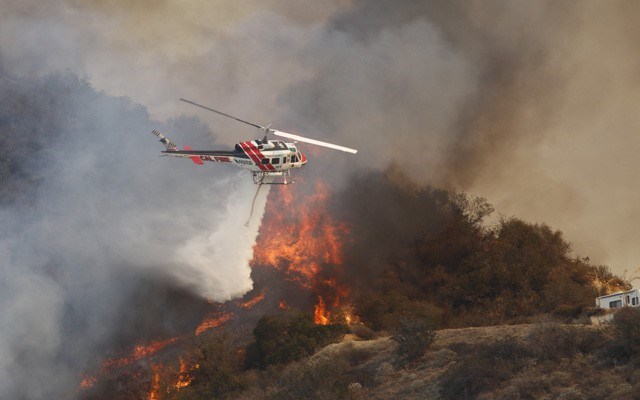A new proposal from a longtime Whistlerite and professional pilot aims to bolster the resort's ability to respond to wildfires before it's too late.
Whistler FIRST (Fire Incident Rescue Strike Team) — presented to the Committee of the Whole on May 7 by Stu Wild — is a not-for-profit firefighting and rescue trust that would provide a dedicated firefighting helicopter capable of quick strike aerial support and rescue within Resort Municipality of Whistler (RMOW) boundaries and the surrounding areas.
Wild has worked as a helicopter pilot for 23 years, specializing in international firefighting in countries such as Greece, Italy, France, Spain, Australia, Canada and the U.S. — and now he hopes to use his experience to help Whistler avert disaster.
Wild said the idea spawned from firefighting techniques used in smaller countries like Italy, where infrastructure is valuable and populations are dense.
"What their idea was is that they couldn't let a fire get bigger than .01 hectare," Wild said in a phone call before the meeting.
"If any fire was started they'd send everything to it right out of the gate, and they would kill it before the fire got bigger than .01 hectare."
In Canada and the U.S., where there is more open space with little infrastructure value, first-response is different. Fires are observed and reported on before an action plan is formed, which can sometimes take more than an hour after ignition — but things are starting to change in two big ways, Wild said.
"One is fires are becoming more aggressive due to climate change, and the second thing is that more people are living in the wilderness," he said.
"These values are starting to pop up more and more, and the one thing that's not being updated is how we're fighting (wildfires) in Canada."
Whistler FIRST would give the community its own quick-strike firefighting helicopter capable of responding to new fires in 15 minutes or less.
Wild said his proposal isn't meant to replace or discredit the BC Forest Service — "they're doing a great job, it's just that they're tasked to protect such a large area that sometimes things get missed," he said — but instead provide an added level of relatively cheap insurance to the resort's robust wildfire protection plan.
For $800,000 to $1 million, Wild hopes to launch this summer with a skeleton crew of one leased aircraft, two pilots and two engineers. A five-member board of directors made up of local stakeholders would oversee the operation and its finances.
Wild's presentation proposed the initial costs be split between the RMOW, Whistler Blackcomb (WB), Tourism Whistler, private fundraising and a $20/home fee, with other potential funding sources like private business contributions, RMI funds or a $0.25 lift ticket add-on.
By making it a trust, finances would be transparent, and any money not used would be rolled over to the following year, he said.
"It's a really progressive program, and to be honest, there are other areas that have done this, but this would be a world-class operation that the town of Whistler and WB, Vail, could get behind and actually tout as a PR piece," he said. "And that's another reason for working it through the trust, is it becomes an asset of the community."
WB employed a similar private response method last June, when a fire broke out in the Million Dollar Ridge area on Whistler Mountain. The mountain operator called Blackcomb Helicopters (BH), which responded to the fire in five minutes and had three helicopters on it by the 20-minute mark, said BH base manager Steve Gray after the presentation.
Gray noted that BH does not have involvement with the Whistler FIRST proposal, and keeps aircraft on hand for fire response during the summer.
"Five or six years ago we recognized the fact that Whistler was becoming vital to our operation and to other stakeholders in the region," Gray said.
"We now keep a minimum of four helicopters at the Whistler base at any given time for search and rescue and/or fire services."
BH doesn't have a long-term contract with the BCFS, but does respond to requests from them throughout the summer, and the company is hired on short-term contracts for initial attack or unit crew support when the fire hazard rating is high, Gray said in a follow up email.
BH has also responded to private industry fire calls (like with WB) to provide fire suppression until BCFS is available.
The municipal budget released last week designated up to $970,000 each year to 2021 to combat wildfire risk, and in January council received a Wildfire Protection Strategy that outlined a potential $16 million prevention effort over the next 10 years.
COW presentations are for information only, so any council decisions on Whistler FIRST will come at a later date.
"We'll take this under advisement and figure out next steps," Mayor Nancy Wilhelm-Morden said.
"It was very interesting and will require some serious thought by us for sure."




